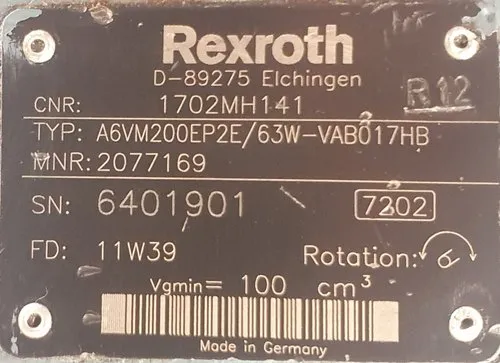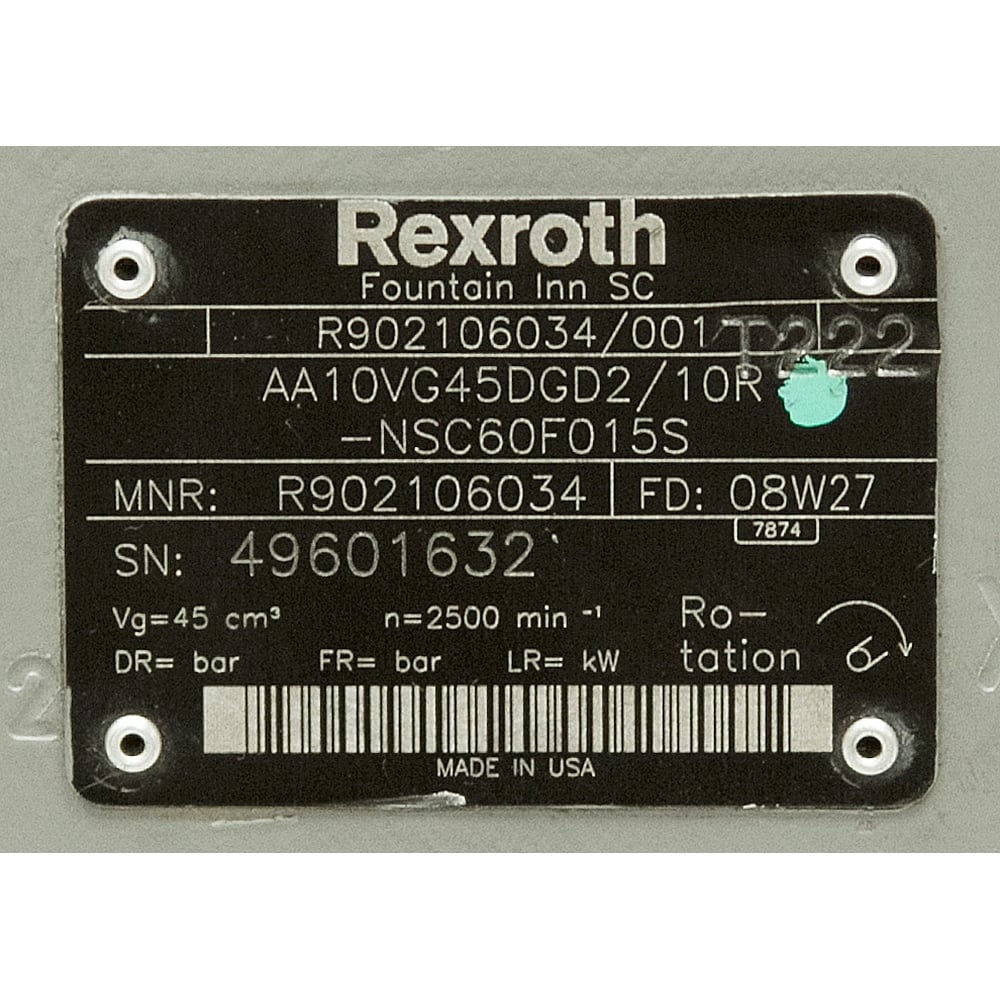June 21, 2024
Pressure Compensator Function: How It Works and Its Importance in Hydraulic Systems
Hydraulic systems are very important in different industrial applications including construction, farming and manufacturing. These must have accurate control of pressure and flow in order to perform optimally and efficiently. One important component that helps in regulating hydraulic system pressure is the compensator function. In this outline, we will look into what pressure compensator function is and why it matters in hydraulic systems. We will also discuss the advantages, uses, maintenance requirements and its effect on system performance and efficiency.

pressure compensator function
Understanding Pressure Compensator Function
Pressure compensator is an equipment used to maintain a constant pressure level of hydraulic systems. It is critical for safe operation as well as efficiency of a hydraulic system.
To do this, the pressure compensator monitors the system’s fluid flow and maintains a constant hydraulic fluid pressure by altering how much fluid flows through it. When the system reaches a predetermined pressure level, the adjustment of oil flow by the incoming currents results from changes made by means of a relief valve orifice located within them. The purpose of this device is to adjust flow direction to ensure constant oil load when certain pressures are reached or dropped.
There exists some different types of these devices including mechanical, electrical and hydraulic ones. Among all other types, mechanical compensators may be viewed as simplest ones that have widely gained popularity. As mentioned earlier mechanical compensation valves rely on spring loaded valves to regulate their discharge capacity rate while electrical ones depend on electronic sensors to help them regulate their flow path whilst hydraulics use other fluids in order to perform their functions.
The choice between different types of these tools depends on requirements imposed upon hydraulics depending upon various technical features they possess Mechanical Pressure Compensators are suitable for simple installations which do not require precise control over output pressures Electrical Pressure Compensators are ideal for systems requiring precision control with fast response times Hydraulic Pressure Compensators are used for heavy applications where system pressures can become quite high.
Additionally, pressure compensators offer overload protection to the hydraulic systems that they are parts of They prevent excess pressure from being built up in the system and consequently damaging its components. This reduces stress on their components thus helping in reducing leaks and other failures in the system.
In general, pressure compensator function is an extremely important aspect of hydraulic systems. It helps these machines run effectively while putting into consideration the longevity of their constituent units. If properly understood and utilized, this feature can result in enhanced productivity, reduced maintenance costs as well as improved safety measures.
Benefits of Pressure Compensator Function
Hydraulic systems depend on accurate pressure control for their safe and efficient operation. This is why the pressure compensator function is so important and also has many advantages that make it an indispensable component in numerous hydraulic systems.
To start with, the main advantage of pressure compensator function is enhanced efficiency. By controlling system pressure, the hydraulic pump only works as much as required to supply system requirements. Consequently, energy consumption and related costs are reduced since the pump does not need to run at full capacity all the time when it is not necessary.
The other major benefit of pressure compensator function is improved safety. Hydraulic systems may be hazardous if there is no regulation of pressure leading to equipment failure or injuries. The pressure compensator performs this task by ensuring that system pressures stay within safe operating ranges thus preventing such hazards.
Moreover, another reason for having a pressure compensator in place is to decrease wearing out of component parts in the system. The force exerted on components like hoses, valves and cylinders can be regulated by a pressure compensator through pressurization or adjustment of flow rates hence reducing wear and tear on these parts. This minimizes need for expensive repairs or replacements and prolongs the lifespans of such unit parts.
In conclusion, it implies therefore that its usage can culminate into heightened output levels plus decreased cost implications pertaining maintenance hence making them vital constituents in various hydraulic systems.
Pressure Compensator Function and System Performance
The pressure compensator function is a vital part of hydraulic systems as it touches on the system’s performance and efficiency directly. The pressure changes whenever hydraulic systems run under various loads. The pressure compensators alter to fit the load on the system so that it can work at its best.
The operation of a system can be optimized for specific applications by adjusting the pressure compensator function. For instance, when speed is critical in an application, one may tune the pressure compensator to allow for maximum flow rate through the system. Conversely, where precision matters most, a similar approach could be employed to achieve a steady flow rate.
Moreover, energy efficiency of hydraulic systems may depend on this feature. When constant pressure and flow rate are maintained, then the machine operates with greater efficiency thus minimizing energy costs and related expenses.
On the other hand, if not properly adjusted there would be decreased performance and efficiency in terms of wearing down some parts of machine .Therefore it is necessary that one understands how to adjust and maintain this aspect in order that it could offer optimum performance over a long period of time.
Importance of Proper Adjustment and Maintenance
The pressure compensator function must be properly adjusted and maintained to achieve the best performance of the system. With time, the settings may become misaligned or wear out hence leading to inefficiency, increased energy use and failure of components before their time.
To ensure that a pressure compensator operates well, it should regularly undergo maintenance and adjustment. This involves checking on pressure levels, flow rates and leaks in order to adjust accordingly the pressures set by the pressure compensator.

pressure compensator function
Specific maintenance instructions provided by the maker should be adhered strictly as there are different procedures for various kinds of compensators used. Moreover, it is advisable not doing any adjusting or fixing work yourself if you do not have special training because you can damage your system or injure yourself most unexpectedly.
Hydraulic systems’ life span can be enhanced while at the same time reducing energy costs of sustenance as well as maintenance expenses through keeping optimum levels of hydraulic system performance and efficiency related with adjusting and maintaining Pressure Compensator functionality.
Applications of Pressure Compensator Function
Pressure compensator function is an essential component in hydraulic systems, and it has many applications across different industries. Pressure compensator function finds its application in various sectors as follows:
- Construction: The construction industry relies heavily on hydraulic systems, and pressure compensator function is particularly useful in this field. Hydraulic systems for construction equipment like cranes or excavators require precise control of pressure and flow rates. In order to work safely and efficiently these machines need a constant pressure in hydraulic system comprising the use of pressure compensator function.
- Manufacturing: Hydraulic systems are commonly used in manufacturing equipment, such as presses, injection molding machines, and assembly machines. These systems have to keep the right control on pressure and flow rates so that the manufacturing process runs smoothly and efficiently. Pressure compensator function promotes regulation of hydraulic fluid’s pressure as well as flow thus ensuring optimal operation of manufacturing equipment.
- Agriculture: The agriculture industry uses hydraulic systems in a variety of applications, including tractors, harvesters, and irrigation systems. Irrigation system being one application where pressure compensator function is most applicable helps keep steady hydraulic system pressures. Ensuring uniform distribution of water over crops is vital for crop growth and yield hence making irrigation system significant to agricultural activities.
- Aerospace: The aerospace industry requires hydraulic systems for a variety of applications, including landing gear, flaps, and brakes. For planes to be operated safely or effectively there must be a constant pressure maintained through pressurized air which comes from the use of pneumatically powered actuators with built-in pressure compensation functions.
- Oil and Gas: The oil and gas industry relies heavily on hydraulic systems for a variety of applications, including drilling and extraction equipment. Drilling process has incorporated the idea thus requiring that during drilling activity it regulates the fluid’s power by maintaining accurate drilling fluid pressures using the hydraulics with establishing control for such fluids via using valves within them thereby necessitating its adoption into drilling operations.
In addition to these industries, pressure compensator function has applications in many other fields, such as marine, transportation, and mining. Pressure compensator function is vital in any hydraulic systems independently of the industry where it is used because it ensures that they operate at their peak performance level.
Resources and Additional Information
In order to keep the pressure compensator functioning in hydraulic systems well-adjusted and maintained, it is essential to be aware of the current industry standards and regulations. Here are some useful links and extra information for you:
- Manuals and technical specifications: Hydraulic system and component manufacturers often provide comprehensive manuals and technical specifications that help in maintaining and adjusting the pressure compensator.
- Instructional videos: Many manufacturers go a step further by providing instructional videos showing how to correctly adjust and maintain the pressure compensators in their hydraulic systems.
- Industry associations: Joining such industry associations as International Fluid Power Society (IFPS) offers access to resources and training on hydraulic systems.
- Trade publications: The pressure compensator function of hydraulic systems can also be managed through reading articles on best practices featured in trade publications such as Hydraulics & Pneumatics or Fluid Power World.
- Training courses: Manufacturers along with industry associations offer various training courses that include maintenance and adjustment of hydraulic systems inclusive of pressure compensator features among others.
By using these sources, users of hydraulic systems can familiarize themselves with good practices within pressure compensating regulations thus optimizing their performance while at the same time reducing wear.
Conclusion
Pressure compensator function in hydraulic systems is an important issue that has rooted out deeply in the outline we have been discussing. One of these aspects is pressure compensator function definition and how it works in maintaining hydraulic system pressure. Other benefits of incorporating pressure compensator function include increased safety, greater efficiency as well as less wear on the components of the system.
We have also considered how adjusting the pressure compensator function can improve system performance in relation to specific applications, and given suggestions for setting up and maintaining pressure compensator functions so that they can provide optimum performance over a period of time.
Moreover, this has involved reviewing the farming industry as well as construction and manufacturing sectors where different types of industries apply this technology including agriculture. This piece has also featured how its use such as by improving efficiency and safety can be applicable in this case.
For more details concerning this outline you should take advantage of what we are providing – that will help you to understand why your pump does not work properly with specific equipment that it was intended for but only with some other type of device. Proper adjustment and maintenance of the pressure compensator function must be highly respected if maximum performance and long lifespan are to be achieved; one must always consider the latest developments within their commercial field.

pressure compensator function
To summarize all those pieces I would say that without understanding Pressure Compensating Function along with its significance, one cannot hope to achieve optimal performance from his or her machine leading to safe operation for both worker/equipment.